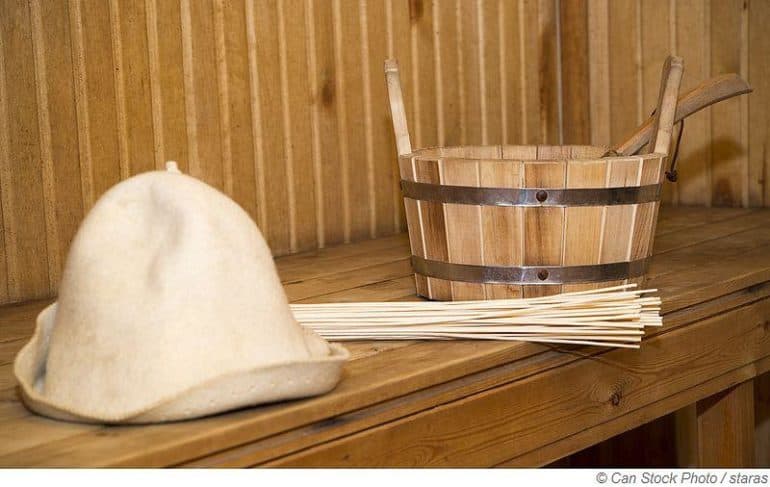Sauna – recreation for body and soul!
In Germany, Austria and Switzerland, the sauna spread only after the end of the Second World War. In addition, there are also bathhouses in Russia, which are called banya in Slavic. Translated, the term means not only bathhouse, but also spa. German soldiers enjoyed the benefits of these soothing relaxation houses during the war. For this reason, a spread of the small “spas” began in Germany after the war.
The German Sauna Association
After some bathhouses enjoyed great popularity in Germany, the German Sauna Association was founded. This association, in cooperation with health experts, scientists and doctors, studied the positive effects of saunas on human health.
Sauna is an alternating bath
Sauna is an effective alternating bath. To begin with, sauna visitors bathe in a wood-paneled cabin, the temperature of which ranges from 60 to 100 degrees Celsius (140 to 212 °F). The duration of sauna bathing ranges from 8 to 20 minutes. The sauna is followed by a walk in the fresh air. This cools both the respiratory tract and the skin. This is followed by a cold shower or relaxation in a cold plunge pool.
Reactions in the body during sauna bathing
During the sauna bath, the skin temperature rises from 30 degrees (86°F) to about 40 degrees Celsius (104 °F). The heat is generated thanks to the hot air and radiation. At the same time, the temperature of the air layer that envelops the body thanks to the sweating process is between 45 degrees and 55 degrees Celsius (113 to 131 °F). Accordingly, the blood vessels in the brain, heart and the entire skin dilate. In addition, the heart rate increases to 125 to 140 beats per minute.
Due to the heavy sweating, the body tries to dissipate the heat. It takes water from the bloodstream and excretes it through the sweat glands. During this process, evaporation produces cold. It absorbs part of the heat of the skin. However, the body does not fight off the heat even with a strong sweating process. Nevertheless, the base temperature rises by 1 to 1.5 degrees Celsius.
Loss of excreted water
Thanks to the sweating process, people lose between 100 and 500 grams of water, with the mineral part of the excreted water amount corresponding to a small part. However, the lost water, which comes from the blood circulation, the body replaces with fluids of the digestive tract and intercellular area.
From this process comes the purification effect. This is due to the origin of the fluid. Since it comes from the intercellular area, it contains numerous metabolic end products, the excretion of which takes place through the kidneys. At the same time there is an activation of the immune system. The higher skin and base temperature produces active substances, which the human body also produces during a fever.
Training of the blood vessels
During the cooling process, the artificially induced body heat is dissipated. A warm foot bath acts as an accelerating factor for cooling and lowering the body temperature. Thanks to the warming of the feet, the skin vessels diverge. Therefore, a faster removal of heat from the inside of the body through the blood circulation takes place.
When cooling down, on the other hand, there is a rapid contraction of blood vessels. This is an automatic reaction of the body to cold. Furthermore, both heart rate and blood pressure decrease. This reciprocal process exercises not only the blood vessels, but also the circulatory system.
Sauna and relaxation
In addition to the physical benefits, sauna also provides mental relaxation. In our hectic and stressful times, many people are looking for ways to relax and escape from everyday life. The sauna provides the ideal place for this. The warmth and tranquility can relax the muscles and calm the mind. Many people report feeling renewed and rejuvenated after a sauna visit.
Aromatherapy in the sauna
Another aspect that is used in many saunas is aromatherapy. By adding essential oils to the sauna water, different scents can be released in the sauna. These scents can be soothing, invigorating or healing, depending on your choice. Popular scents include eucalyptus, lavender or citrus.
Sauna and skin care
The sauna also has positive effects on the skin. Sweating opens the pores, and dirt and impurities can be removed more easily. This leads to clearer and healthier looking skin. Thoroughly caring for the skin after a sauna session is still important to keep it moisturized and soft and supple.
Precautions and tips
Before going to the sauna, drink enough to compensate for fluid loss. People with cardiovascular disease or other health problems should consult their doctor before taking a sauna. It is advisable not to go to the sauna directly after eating. A sauna session should always be finished with a cold shower.

